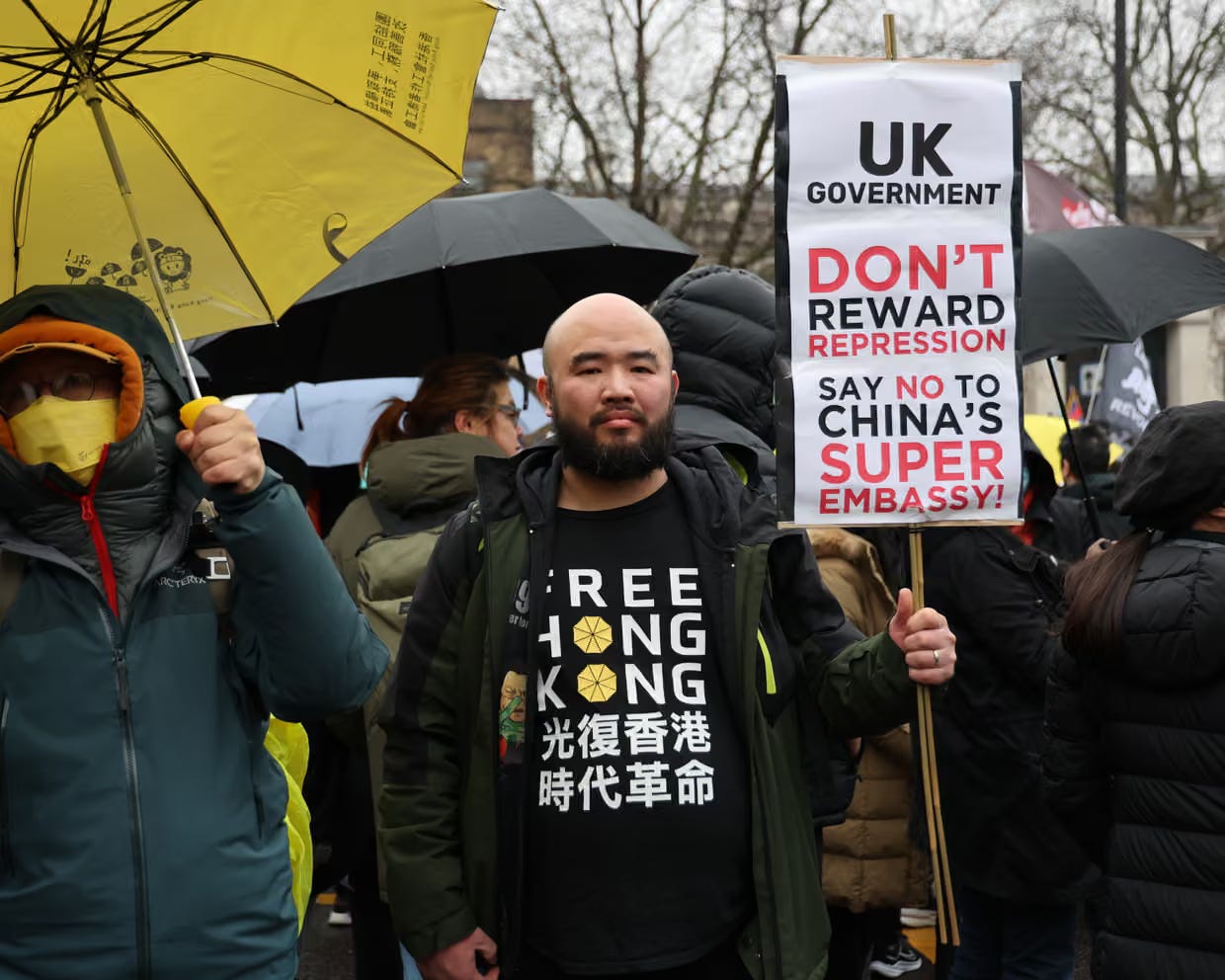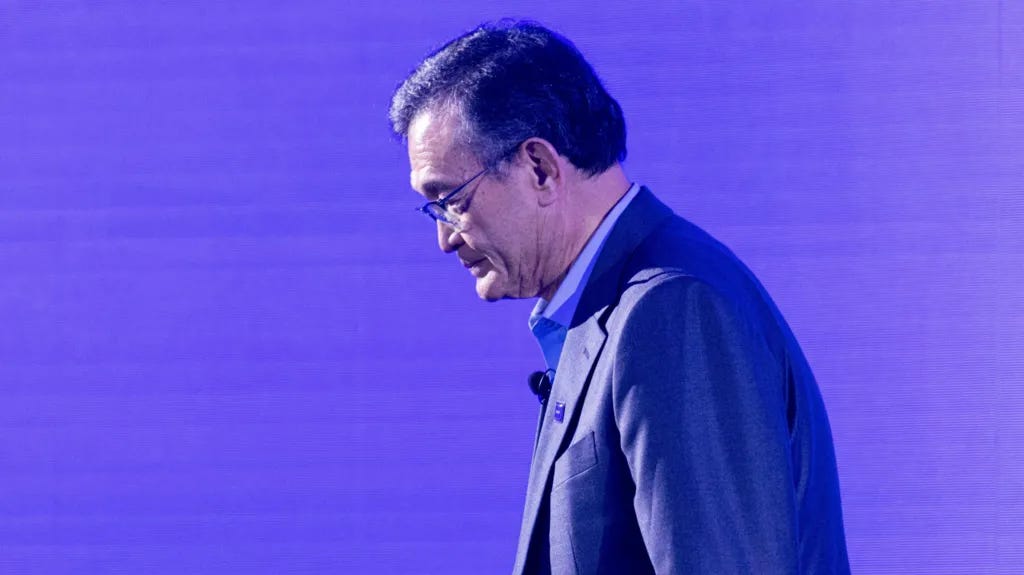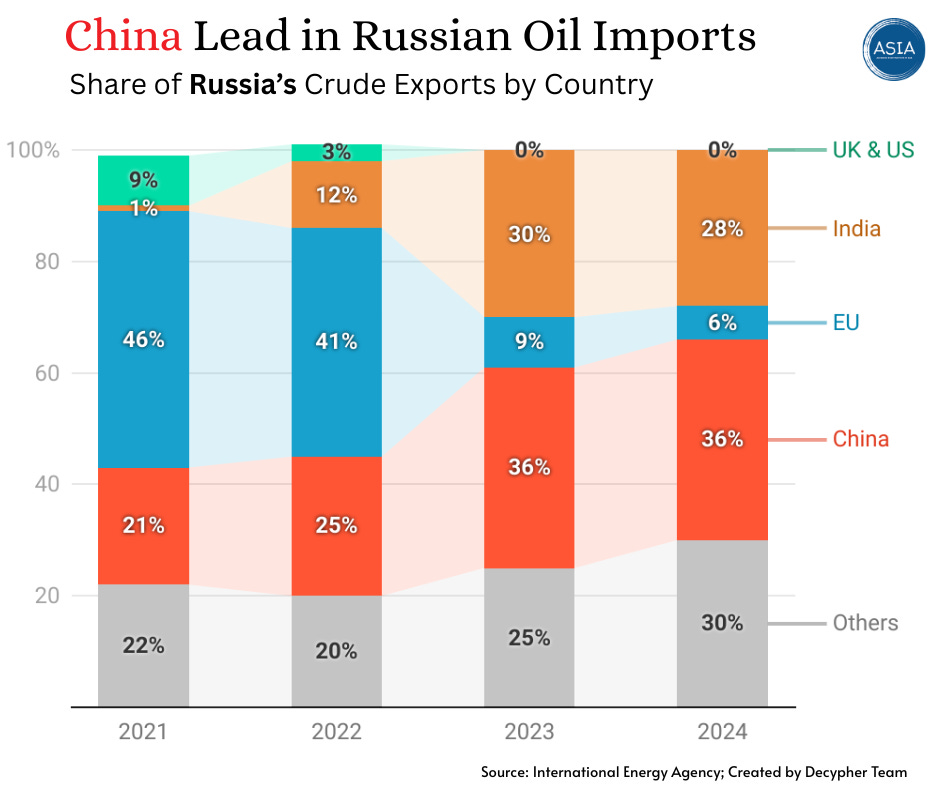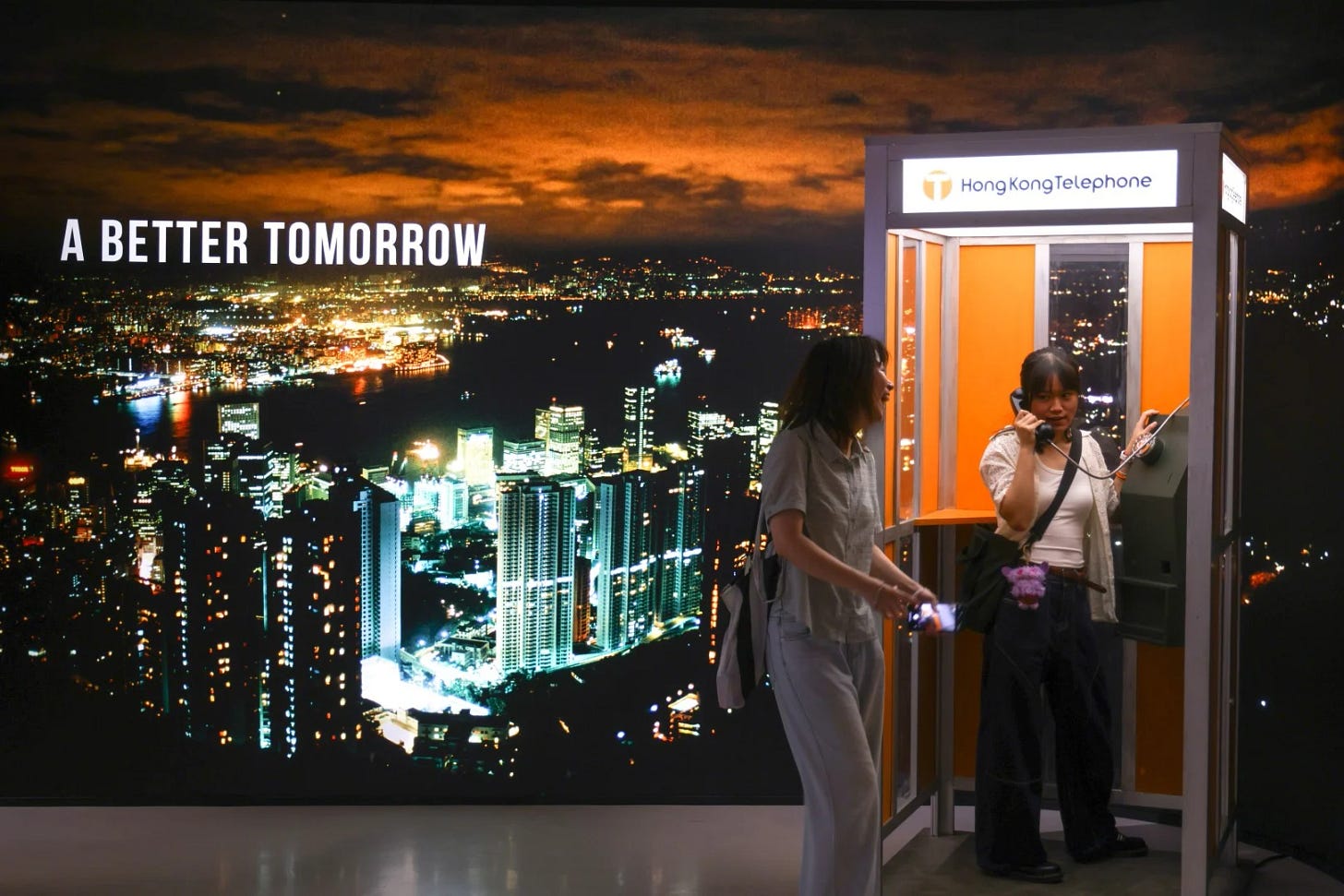China This Week: Rising Consumer Debt, UK Pushback on ‘Super-Embassy’, PM Modi’s First China Visit in 7 Years
This week in China, we explore key shifts in its domestic and foreign policy landscape.
China Quote 🗩
“Trump’s tariffs on imported chips showed that the American leader was still testing the limits of economic policies, even though they were damaging global growth and adding to inflation in the United States."
“For Southeast Asian countries, this is a confirmation that exporting to the US has become much harder, that the US is not a reliable partner and that you cannot trust it even if you manage to sign a deal”
Antonio Fatas, professor of economics at INSEAD business school
Economic Activity🏦
China’s July Exports Beat Forecasts as Imports Post Biggest Gain in a Year
CNBC reports that China’s exports rose 7.2% year-on-year in July, surpassing expectations, while imports grew 4.1%—their fastest pace since July 2024. The gains came despite a steep drop in U.S.-bound trade, with exports diverted to Southeast Asia and the EU. Rare earth, auto, and semiconductor exports all saw double-digit growth ahead of the Aug. 12 expiry of the U.S.–China tariff truce.
China’s Export Growth Accelerates Despite U.S. Slump
Bloomberg reports that China’s exports rose 7.2% year-on-year in July to $322 billion, the fastest pace since April, defying expectations of a slowdown. Gains were driven by stronger demand from global markets, offsetting a continued decline in shipments to the U.S. Analysts noted that a low base from last year also boosted the year-on-year figures.
China’s Consumer Debt Crisis Deepens Amid Push for Lending
The New York Times reports that Beijing’s drive to expand consumer lending is fueling a personal debt crisis, with defaults doubling since 2019 to as many as 34 million borrowers last year. Young people are particularly affected, often caught in high-interest online loan cycles amid weak job prospects and stagnant wages. Analysts warn that without a personal bankruptcy system or stronger social safety nets, the policy risks worsening financial distress rather than boosting consumption.
China’s Solar Giants Cut Nearly a Third of Jobs Amid Industry Slump
Reuters reports that China’s largest solar firms shed around 87,000 jobs—31% of their workforce—in 2024 as overcapacity, falling prices, and U.S. tariffs battered the sector. More than 40 companies have closed, gone bankrupt, or been sold since last year. Beijing is signaling intervention, including potential capacity cuts and price stabilization measures, but analysts warn significant reductions—up to 30%—are needed for the industry to return to profitability.
China Moves to Curb EV Price Cuts Amid Overcapacity Fears
Tech in Asia reports that Chinese regulators have urged electric vehicle makers to avoid excessive price cuts, warning that aggressive discounting could destabilize the market. The guidance comes as EV production capacity outpaces demand, prompting concerns of a sector-wide glut similar to the solar industry’s troubles. Authorities are pushing for “orderly competition” to maintain profitability and protect smaller manufacturers.
TSMC Shares Hit Record After U.S. Tariff Exemption
Bloomberg reports that Taiwan Semiconductor Manufacturing Co. surged to a record high after Taipei confirmed it will be exempt from new 100% U.S. tariffs on semiconductor imports. Officials said the exemption is due to TSMC’s U.S.-based plants, while other Taiwanese firms could still face levies if they lack similar operations.
Inside China🐉
China Deploys Drones and Fines to Contain Chikungunya Outbreak
AP News reports that China is battling its largest recorded chikungunya outbreak, with over 7,000 cases in Guangdong province. Authorities are using drones to locate mosquito breeding sites, spraying insecticide, distributing nets, and imposing fines up to 10,000 yuan for failing to remove standing water. The outbreak’s rapid spread is attributed to heavy rains, high temperatures, and a population with no prior immunity.
Five Dead in Xinjiang Suspension Bridge Collapse

Channel News Asia reports that five people died and 24 were injured when a cable snapped on the Jiangjun suspension bridge at Xiata Scenic Area in Xinjiang, causing the deck to tilt sharply. Footage showed stranded tourists clinging to the bridge as others fell. The site has been closed for safety inspections; a similar incident occurred there in 2024 without casualties.
Star China Banker Bao Fan Leaves Detention After Two Years
Bloomberg reports that Bao Fan, one of China’s most prominent bankers, was released from detention more than two years after he vanished from the public eye due to an investigation by Chinese authorities.
China and the World🌏
PM Modi to Visit China for First Time in Seven Years Amid U.S. Trade Strains
Reuters reports that Indian Prime Minister Narendra Modi will attend the Shanghai Cooperation Organisation summit in Tianjin on August 31, marking his first China visit since 2018. The trip follows a thaw in Sino-Indian ties after the 2020 border clash but comes as relations with Washington face their toughest test in years due to steep U.S. tariffs and threats over India’s Russian oil imports.
Beijing Warns Manila Over Taiwan Comments by Marcos
SCMP reports that China has cautioned the Philippines to “stop playing with fire” after President Ferdinand Marcos Jr. said his country would “have to get involved” in any U.S.-China confrontation over Taiwan due to its geographic location. Beijing accused Manila of undermining the one-China principle, damaging bilateral ties, and using “geographical proximity” as an excuse for interference in China’s internal affairs. The warning follows Manila’s closer security cooperation with Washington and increased engagement with Taipei, which has already drawn protests from Beijing.
UK Demands Unredacted Plans for China’s Proposed London ‘Super-Embassy’
The Guardian reports that UK ministers have given the Chinese embassy two weeks to justify or remove redactions from design drawings for its planned 20,000 sq m “super-embassy” at Royal Mint Court. Housing Secretary Angela Rayner warned that the omissions could breach public transparency rules ahead of a 9 September approval deadline. The project, facing strong local opposition over security and human rights concerns, has become a point of diplomatic tension between London and Beijing.
Trump Urges Intel CEO to Resign Over Alleged China Links
BBC reports that President Donald Trump has called for Intel CEO Lip-Bu Tan to step down immediately, citing alleged investments in Chinese firms tied to the military. Intel defended Tan, stressing its commitment to US national security. The clash comes amid political scrutiny of US-China tech links and delays in Intel’s domestic manufacturing plans.
Chinese Woman Charged Under Australia’s Foreign Interference Laws
AP News reports that an Australian permanent resident from China has been charged with covertly gathering information on a Canberra Buddhist association banned in China, allegedly for the Public Security Bureau. She is the third person — and first foreign national — prosecuted under the 2018 laws, which criminalize covert activities on behalf of foreign powers. The woman faces up to 15 years in prison if convicted.
China Deploys A.I. Firm in Global Information Operations
The New York Times reports that leaked documents show Chinese tech firm GoLaxy has used advanced A.I. to track political figures, shape narratives in Hong Kong and Taiwan, and support Beijing’s policy goals. The firm’s “Smart Propaganda System” mines massive social media datasets to target messaging, and has profiled over 100 U.S. lawmakers. While no U.S. influence campaigns have been confirmed, officials say GoLaxy’s work aligns closely with China’s national security strategy.
China and Pakistan Expand Tech Cooperation to Nuclear, Space, and AI
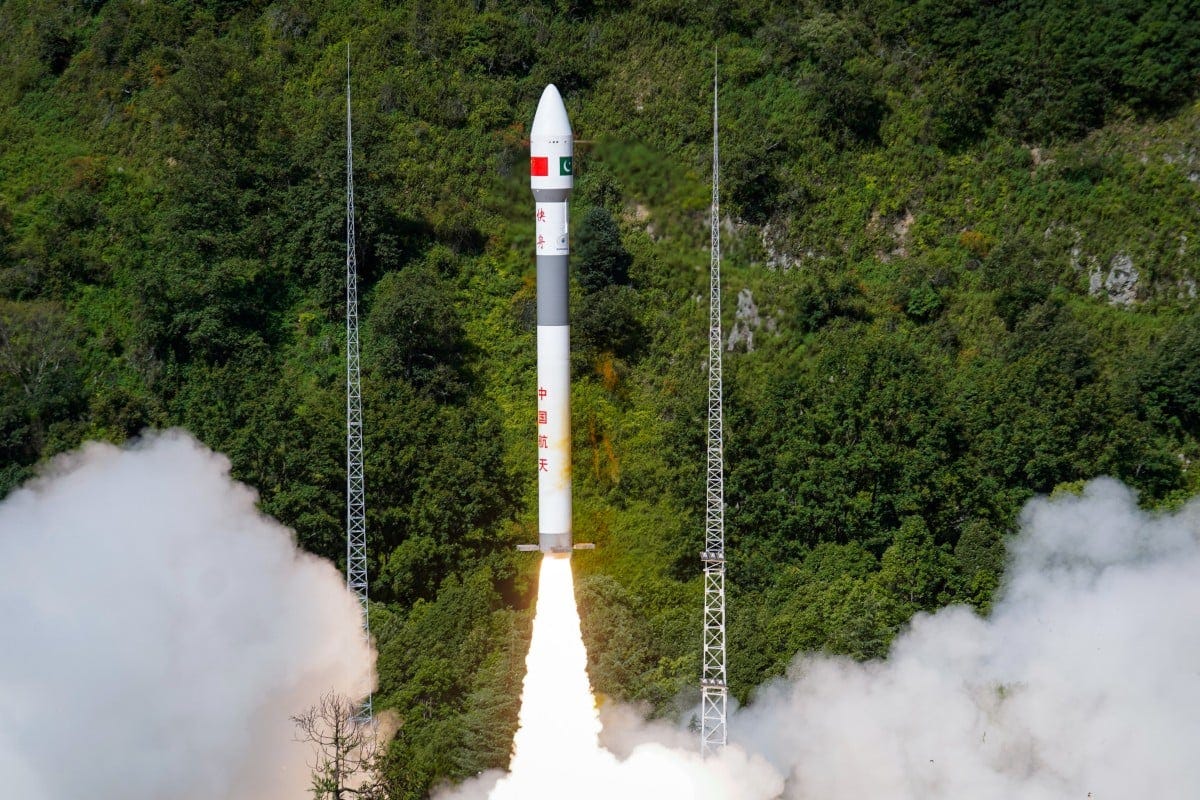
South China Morning Post reports that Pakistan’s planning minister Ahsan Iqbal met Chinese nuclear and space agency heads to deepen cooperation in peaceful nuclear energy, satellite launches, AI, and quantum computing. Plans include sending Pakistani astronauts to China’s space station in 2026 and a joint lunar mission by 2029, alongside training Pakistani scientists in emerging technologies.
Why Taiwanese fear China could take over from within
Financial Times reports rising concern that Beijing is using political, economic, and cultural influence to subvert Taiwan from within. Activists accuse the opposition Kuomintang of echoing CCP rhetoric and benefiting from Chinese funding, while Beijing’s “United Front” tactics — from courting politicians to spreading disinformation — deepen divisions that could enable peaceful unification.
‘Hanger War’: Chinese Mafia Turf Battle in Italy’s Fast-Fashion Hub
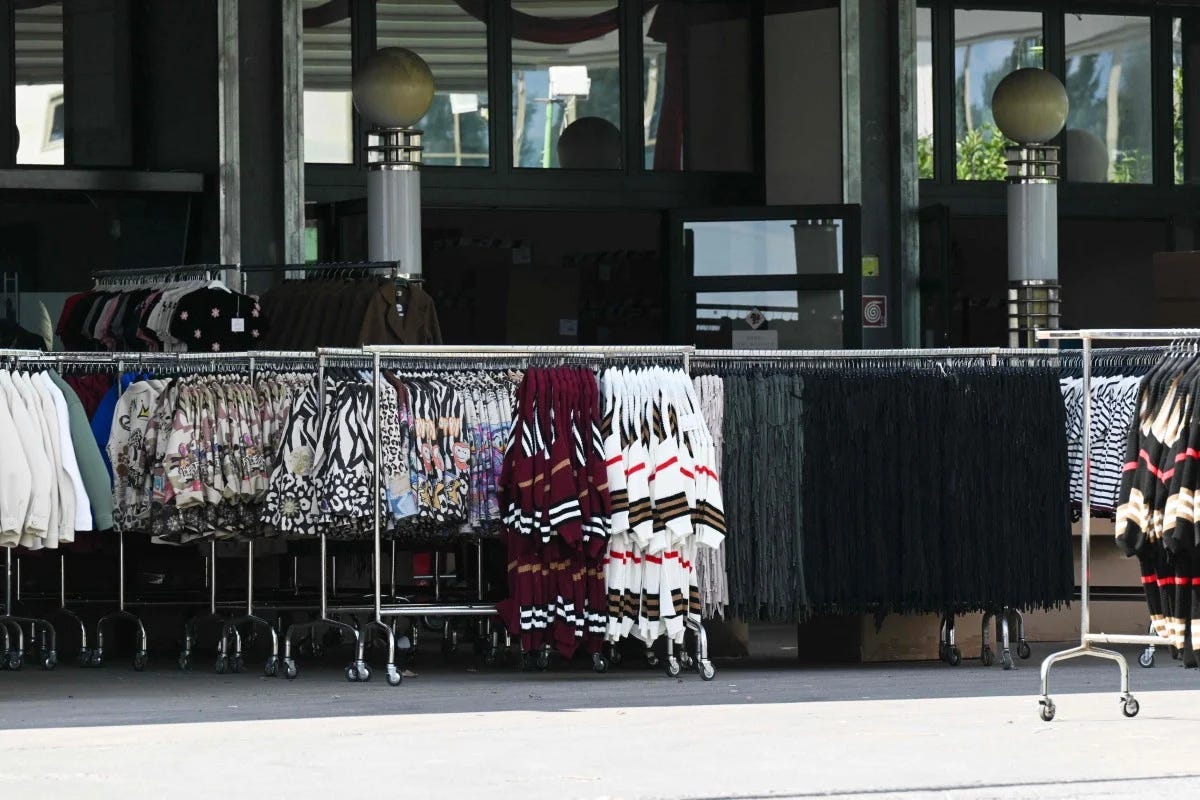
South China Morning Post reports that rival Chinese mafia groups in Prato, Italy—Europe’s largest apparel manufacturing hub—are fighting for control of a €100 million (US$115 million) clothes-hanger market and the wider apparel transport business. Prosecutors warn the conflict has spread to France and Spain, involving violence, arson, illegal immigration networks, and exploitation of Chinese and Pakistani workers in unsafe, low-wage conditions. Authorities say the gangs thrive on Prato’s entrenched “system” of tax fraud, labour abuses, and corruption.
Tech in China🖥️
The AI Showdown: US vs China
Bloomberg reports that the US and China dominate the global AI race, with Washington pushing proprietary high-performance models and Beijing promoting cost-efficient, open-source alternatives to gain worldwide adoption. The US retains a slight technological edge, but China is rapidly closing the gap with massive state investment, talent repatriation programs, and a growing domestic chip industry. Both see AI as a strategic and defense priority, with competition spanning infrastructure, governance, and global standard-setting.
China Targets Neuralink Rivals in Brain-Computer Interface Push
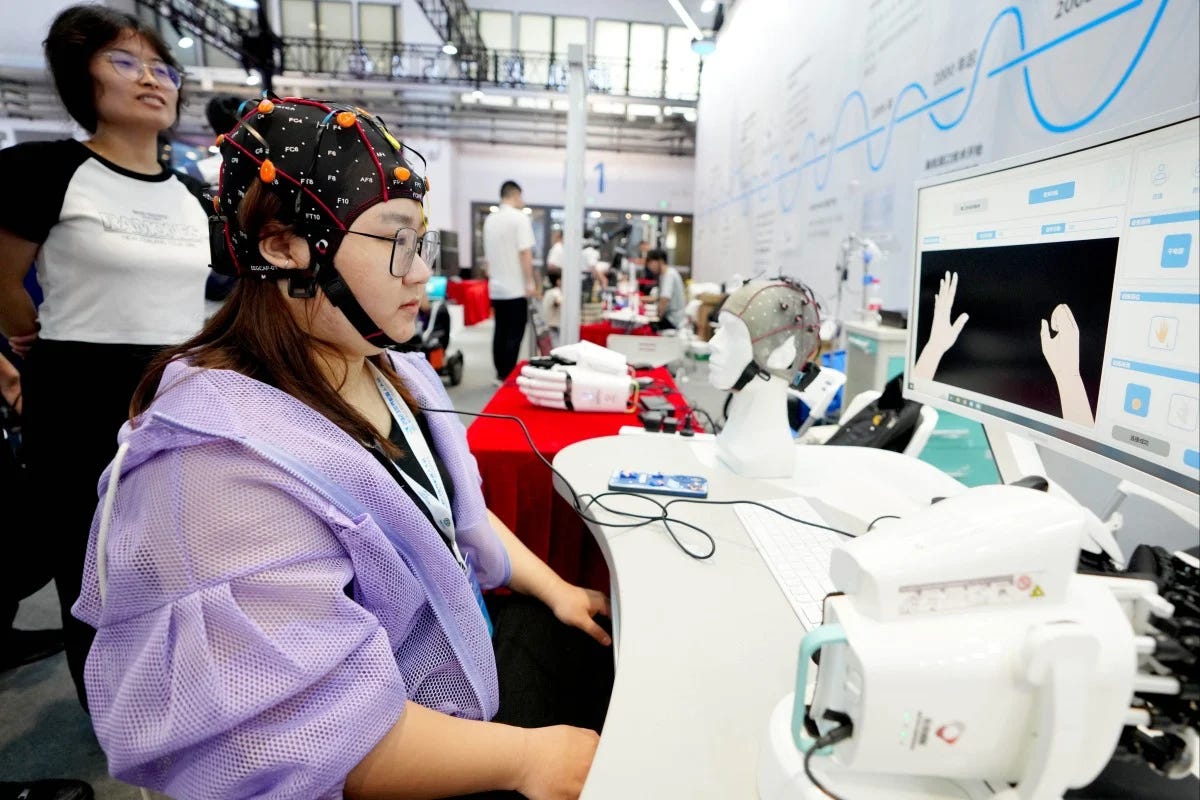
South China Morning Post reports that Beijing has unveiled a policy to create “two or three” world-leading brain-computer interface (BCI) companies by 2030, aiming to rival Elon Musk’s Neuralink. The plan, released by seven ministries on July 30, seeks breakthroughs in key BCI technologies by 2027 and the growth of “little giant” and unicorn firms. The announcement sent shares of Nanjing Panda Electronics, MicroPort NeuroScientific, and other BCI-linked stocks surging. China’s BCI research is advancing rapidly, with clinical trials, hospital BCI wards, and claims of less invasive, more accurate devices than Neuralink’s implants.
Decypher Data Dive📊
Between 2020 and 2024, Russia’s crude oil and condensate exports to China rose by 500,000 barrels per day (b/d). China remained the top importer, averaging 2.2 million b/d in 2024 and 2.0 million b/d in the first half of 2025.
Image of the Week📸
The “Undercover Underworld” exhibition at Tai Kwun features iconic Hong Kong undercover and crime films like “Infernal Affairs”, “Man on the Brink”, “City on Fire”, “A Better Tomorrow”, and “Hard Boiled”.
— — —
Data By Bhupesh
Edited By Aurko
Produced by Decypher Team in New Delhi, India


